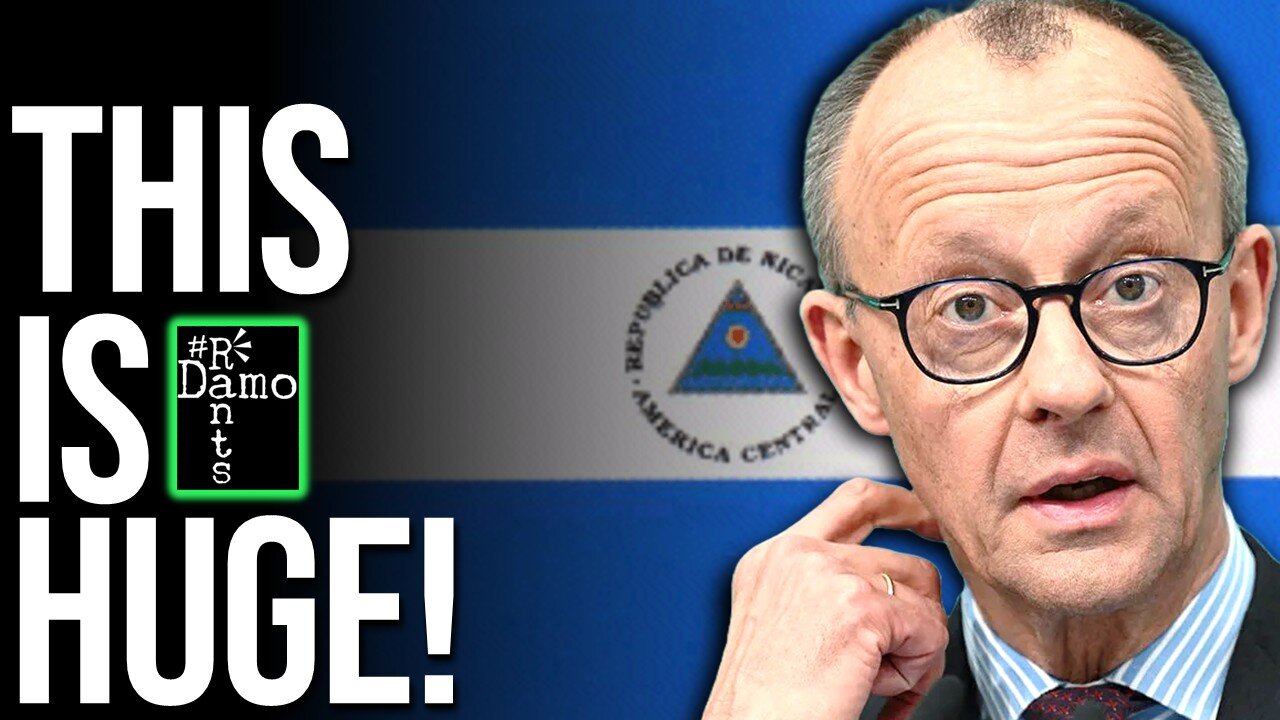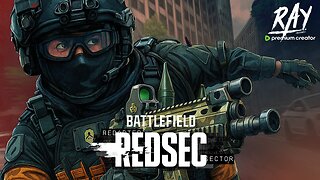Premium Only Content

The Case That Could Bring Down the West Over Israel: Nicaragua v Germany
Right, so Germany, the state that built its post-war identity on the promise of “Never Again,” is now defending itself at the International Court of Justice for continuing to arm a state the Court has already said is putting Palestinians at serious risk of genocide. And it’s not a misunderstanding, it’s not confusion, it’s not some bureaucratic tangle. Germany knew the ruling, knew the risk, and signed the export licences anyway. That’s on the record.
Now Nicaragua has dragged them to The Hague, not to accuse them of pulling the trigger, but of supplying the ammunition once the law said stop. And the worst part? They’re not even arguing they did prevent genocide. They’re arguing that nobody should be allowed to ask if they did. And that tells you everything.
Right, so the break did not come from activism, protest, journalism or political speech. It came from the International Court of Justice, in the language only the Court uses, when it stated that the Palestinian population in Gaza is facing a serious risk of genocide. This was issued in January 2024 as part of the provisional measures in the case brought by South Africa. The phrasing matters. The ICJ does not use the word genocide unless the evidentiary threshold of risk is met, no matter how many world leaders quibble over that. That threshold is not rhetorical, it is not emotional. It is legal. It rests on patterns of killing, patterns of displacement, patterns of destruction of civilian infrastructure, and statements and conduct from state officials that indicate the targeting of a protected group.
Once the Court identified a serious risk of genocide, the Genocide Convention became active. The Convention does not only prohibit states from committing genocide. It requires states to prevent genocide wherever they have the capacity to influence events. This duty is binding on all parties to the Convention. There are no special exemptions for strategic alliances, historical identity narratives, or claims of security necessity. The obligation is absolute: if a state has the ability to act, it must act to prevent genocide once the risk has been recognised.
Germany is a state that has such capacity. It is not a bystander. It is not merely an observer. It is a material supplier of weapons, equipment and military assistance to Israel. That is documented in Germany’s own arms export licensing data. Over a twenty-year period, from 2003 to 2023, the German state authorised more than three billion euros in military exports to Israel across thousands of individual licences. These authorisations were approved through formal administrative procedures. They were not accidental or peripheral. They were a sustained and structured component of Germany’s foreign and defence policy.
After the escalation of violence in Gaza after the events of October 7th 2023, Germany continued issuing export approvals. German officials acknowledged these approvals in public statements. The continuation occurred after the ICJ’s genocide-risk finding. This sequence is the core of the legal case now before the Court in Nicaragua v. Germany.
Nicaragua filed the case on 1 March last year. It claims that Germany has breached its obligations under the Genocide Convention by continuing political, financial and military support to Israel while the Palestinian population in Gaza is under a judicially recognised genocide risk. Nicaragua is not accusing Germany of committing genocide. It is asserting failure to prevent genocide where Germany had the capacity to prevent. Under the Convention, that failure is in itself a breach.
The ICJ agreed to hear the case. It declined to impose emergency provisional measures, but it did not dismiss the application. This means the Court considers the question of Germany’s compliance with its obligations to be valid and unresolved therefore. As a result, Germany is now formally before the Court to account for its conduct.
The legal framework underlying the case is clear. The ICJ’s 2007 judgment in the Bosnia case established that a state does not need to intend genocide or participate directly to be responsible for breach of the Convention. The duty to prevent is triggered when the state knows or should know that there is a serious risk of genocide, and the state fails to use available means to prevent it. The Court has already identified the serious risk. Germany’s export control system is proof of capacity. The continuation of supply after January 2024 is the alleged breach.
Germany’s official response in The Hague did not attempt to demonstrate that it took steps to prevent genocide. It did not claim that it conditioned or suspended arms supply. It did not claim that it intervened diplomatically to reduce risk. Instead, Germany challenged the Court’s jurisdiction and Nicaragua’s standing to bring the case. These are procedural defences. They do not answer the substantive question. They aim to prevent the question from ever being examined. Screams innocence doesn’t it?
When a state relies on procedural defences rather than substantive ones, it is because the substance cannot be defended.
This case is not isolated in its significance. It carries implications beyond Germany. The same legal principle applies to any state that continues to provide arms, military financing or operational support to Israel after the genocide-risk finding. The United Kingdom participates in the production of aircraft used by Israel. The United States provides large-scale weapons supply and financing. Other European states participate in defence procurement networks and technology sharing arrangements. All are bound by the same Convention. All are subject to the same duty.
This is why the case is largely absent from parliamentary debate, major newspaper front pages and broadcast political programming. It is not complicated. It is not uncertain. It is not moving through obscure legal channels. It is simply too damaging to be acknowledged openly by the pliant client mainstream media. If recognised publicly, it would force a confrontation between foreign policy and binding international law. It would force states to choose between alliance-based military policy and legal obligation. The preference has been to avoid acknowledging the choice altogether. It is a point independent journalist Craig Murray raised in a tweet in relation to this news, where he said:
‘This is an extremely important case with potentially huge ramifications. Nicaragua is accusing Germany of military, political and financial support for the Genocide in Gaza. Germany has replied by challenging Nicaragua's standing. If ultimately Germany loses - as it should - there are massive implications for both International Criminal Court and domestic legal proceedings against German leaders. It also sets a precedent for other cases - the UK, USA and EU.’
And he’s not wrong, therefore the MSM bury it.
Back to the case at hand though, Germany’s role in relation to Israel is not only strategic. It is historical. German government leaders have stated publicly, on record, that Israel’s security is part of Germany’s national identity. This principle, commonly referred to as Staatsräson has shaped foreign policy across multiple administrations. It is rooted in the German state’s relationship to its own history of genocide. The idea was that Germany’s historical responsibility required unconditional support for Israel.
But the Genocide Convention does not ground duties in history. It grounds them in the protection of any group facing genocide risk now. The duty applies to the threatened population, not the historically associated one. Once the ICJ recognised genocide risk in Gaza, Germany’s narrative of historical responsibility and Germany’s legal duty to prevent genocide diverged. One pointed to continued support. The other required intervention to prevent harm.
This is the fracture inside German state identity: the doctrine built to prevent repetition of genocide is now being used to justify continued support in the presence of genocide risk.
This is why the Nicaragua case is not only legal. It is existential. It challenges the story Germany uses to describe itself. And when the story is challenged by the law, the silence of the state becomes the only defence available.
When we talk about Germany supplying weapons to Israel, we are not talking about something abstract or symbolic. We are talking about a system of state administration that signs export licences, authorises shipments, coordinates production, and ensures continuity of supply across budget cycles and changes in government. German arms exports operate through a formal licensing regime administered by the federal government. Companies cannot export weapons or military components without government approval. These approvals are reviewed at the ministerial level. They do not happen automatically. They happen because the state authorises them to happen.
This is what makes the continuation of supply after the International Court of Justice found a serious risk of genocide so significant. There is no way to describe this continuation as accidental. Export approvals require deliberate action. They require officials to review documentation, confirm classification, and sign off on transfer. If the licences are granted, it is because the state has decided that the export should proceed.
Therefore there is no plausible argument that Germany “did not realise” what it was authorising. The ICJ ruling was widely reported, formally notified, and delivered directly to states as parties to the Convention. Germany knew the risk and continued supply regardless.
The Forensis/ECCHR export dataset confirms that German arms exports to Israel are not sudden or reactive. They are structural. Over twenty years, thousands of export approvals show a stable and ongoing defence relationship. The fact that the approvals continued after the ICJ ruling demonstrates continuity of policy, not a momentary mistake.
Germany has publicly claimed that its export controls ensure respect for international humanitarian law. That is a common formulation in export policy language. But under the Genocide Convention, that is not the test. The test is whether the state took steps that could reasonably be expected to prevent genocide once risk was identified. Oversight does not prevent genocide. Suspension does. Conditioning does. Intervention does. Germany did not suspend, condition, or intervene. It continued.
This is the core of Nicaragua’s case. Germany did not act to prevent genocide where it had the legal obligation and the practical ability to do so. That obligation does not require certainty that genocide will occur. It requires action when the risk is serious. The ICJ confirmed that the risk is serious. The duty was active. Germany continued supply. The breach lies there.
The ICJ did not need to determine whether genocide has already occurred to invoke the duty to prevent. The Convention is preventative. That is the point. The Court uses the phrase serious risk of genocide when it determines that conditions exist such that genocide is foreseeable if not stopped. That is the threshold for activating state responsibility. It means states do not get to wait for confirmation of genocide before acting. They must act to prevent the possibility.
This is why the language matters. The ICJ does not use the word “genocide” casually. It does not use it as political pressure. It uses it as a legal designation. Once that designation is applied, the duty applies. If states could wait until genocide is conclusively proven, the Convention would have no preventative function. By the time genocide is confirmed, the population is already destroyed.
Germany knew the risk because the ICJ ruling is public, binding and directed to all states party to the Convention. Germany had the capacity to act because it controls arms export licensing directly. Germany did not act. Therefore the legal question now under review is whether that failure constitutes breach. That is why the case is proceeding.
The scale of what follows from that question goes far beyond Germany.
If the Court finds that Germany breached its duty to prevent genocide by continuing arms exports to Israel after the risk was recognised, then the same legal reasoning applies to every other supplier state.
The United Kingdom contributes to the manufacturing of components used in Israeli aircraft. That participation is part of its industrial defence cooperation agreements. The UK therefore has material influence. The duty applies.
The United States provides military financing and direct weapons supply to Israel under formal budgetary authorisation. That is influence at scale. The duty applies.
Other European states participate in procurement, development and logistical networks that feed into Israeli military capability. Influence exists. The duty applies.
This does not require any court to find that Israel is committing genocide. The duty is triggered at the level of risk, not at the level of final determination. The ICJ has already found the risk. Therefore, the duty is already active for all supplier states.
Western governments understand that this case is not simply about Germany therefore. It is about whether the West can continue its current model of strategic military support while claiming to adhere to humanitarian law.
This is the structural crisis that this case opens.
Nicaragua did not appear as a random or unlikely party. Nicaragua has a history of bringing cases to the ICJ when confronted with actions of more militarily powerful states. In the 1980s, Nicaragua successfully brought a case against the United States over unlawful use of force and support for armed activities inside its territory. Nicaragua won that case. The Court ruled in its favour. The United States rejected enforcement, what a surprise. But the ruling stood in international law.
This history matters. Nicaragua has experience using international law to hold more powerful states than itself to account. It is, in other words, one of the few states willing to challenge Western actors directly at the ICJ. It also has no dependency on alliance structures that would prevent such an action. Nicaragua is acting within the rights granted by the Convention. It is not breaking order. It is invoking it.
What makes this moment historically significant is that the states invoking genocide law are those historically subjected to the global hierarchy, not those enforcing it. The humanitarian legal system is now being used to restrain those who once treated it as a tool of their own power projection.
Even before the Court reaches a final ruling on this case therefore, the consequences are already in play.
The ICJ has recognised genocide risk.
Germany continued to supply arms after that ruling.
The duty to prevent applies once risk is recognised.
Those facts cannot be withdrawn.
This means the question of Western complicity is no longer an accusation. It is a legal question under active determination. It has entered the judicial record. It will not leave it.
This is why the collapse now underway is not dramatic or theatrical. It is administrative. It is procedural. It is slow. But it is irreversible as well.
The West no longer holds the uncontested claim to moral authority in matters of atrocity and humanitarian law. The Genocide Convention is now being enforced by those the West once marginalised. The enforcement is legal, not rhetorical. It is grounded in the Court, not the street.
Once this alignment changes, it does not change back.
For decades, Western governments have framed themselves as the arbiters of international law and humanitarian principle. They positioned their foreign policy as the defence of a rules-based order. The claim rested on the idea that Western power was tied to legal and moral responsibility. This claim has been central to NATO narratives, EU external diplomacy, and United States doctrine for years. It is the foundation on which sanctions regimes, humanitarian interventions, and human rights criticisms have been justified.
So now the Nicaragua v. Germany case exposes that claim at its weakest point. It does not do this through ideological critique. It does it through documentation. The ICJ has already recognised genocide risk. Germany’s arms exports are already a matter of record. The continuation of supply after the risk was recognised is already acknowledged. The duty to prevent is already binding. None of this depends on interpretation. It is the literal structure of the situation.
The collapse of legitimacy happens when documented state action cannot be reconciled with the state’s stated values. Germany claims that its support for Israel is grounded in historical responsibility and moral commitment. But the Genocide Convention, which was constructed precisely to prevent repetition of mass atrocity, does not permit moral exceptions. Its duty is universal. It requires prevention of genocide regardless of alliance or identity.
When Germany continued to supply arms to a state operating under genocide-risk conditions, the claim to moral responsibility inverted. The narrative designed to prevent repetition of atrocity became the justification for continued support during atrocity risk. That inversion is visible. It cannot be hidden.
This collapse does not occur only in Germany. It extends across the Western foreign policy system. The United Kingdom has publicly presented itself as a defender of international humanitarian law. The United States has positioned itself as the global guarantor of security and democracy. European Union institutions have framed themselves as champions of human rights. But each of these political identities rests on the assumption that when atrocity is identified, they act to prevent it.
The record now actively shows otherwise.
There is no messaging strategy that can reconcile a genocide-risk finding with continued arms supply. There is no diplomatic language that can resolve a contradiction this fundamental. The system of justification does not break at the point of accusation. It breaks at the point of record. And the record is fixed.
This is the shift. Not only is the West no longer the agent enforcing humanitarian law. It is now the subject of that law. The legal standards that Western governments once used to evaluate others are now being used to evaluate them. The shift is not discursive. It is procedural. It is happening inside the ICJ.
This is why the silence from our politicians, from our media is comprehensive. Silence is the only tactic available when contradiction has reached the structural level.
There is historical significance to the fact that South Africa and Nicaragua are the states enforcing the Genocide Convention in this moment. Both states experienced domination and coercion under systems justified by claims of civilisational superiority. Both states have seen international law used selectively, deployed when Western interests aligned with it and disregarded when they did not. Both states understand international law not as an abstract set of norms, but as a field where power determines application.
When South Africa brought the genocide case concerning Gaza, it acted in the same legal tradition that called apartheid a crime. When Nicaragua brought the case against Germany, it acted in the same legal tradition in which it previously challenged the United States’ use of force in the 1980s. These are not symbolic gestures. They are consistent applications of legal memory.
This inversion carries consequences for how the current moment will be understood historically. The historical narrative of the twentieth century positioned the West as the builder of an international order designed to prevent mass atrocity. But the record of the twenty-first century shows the enforcement of genocide law being led by states outside the Western alliance system. The moral authority has moved.
This shift is not dependent on the final outcome of the Nicaragua case. Once the enforcement initiative has moved, the legitimacy has moved. The legal argument now sits globally, not regionally. Not Westernised. The authority to speak about genocide, prevention and responsibility no longer belongs to Western capitals by default.
The historical record of this period will not be shaped by the arguments currently being made in media commentary. It will be shaped by the documents that remain. The ICJ genocide-risk finding will remain. The German arms export data will remain. The continued approvals after the ruling will remain. The Nicaragua filing will remain. The refusal to suspend supply will remain. These documents will form the basis of historical judgment.
Political messaging and narrative framing cannot remove these documents. They cannot reinterpret them without contradiction. They cannot discard them without leaving the record clearly incomplete. The future interpretation of this moment will therefore be grounded in what the record already shows.
Future generations will not debate whether the West knew. They will ask why the West continued.
The question will not be “Was the risk understood?” The Court understood it. It said so. The question will not be “Did the state have the capacity to act?” The export licensing system demonstrates the capacity. The question will not be “Was the legal obligation unclear?” The obligation is plain in Article I of the Convention and in the Bosnia judgment.
The question will be:
Why did states choose to continue providing the means of violence once genocide risk had been established?
The answer is already visible.
They chose to maintain alliance, power and strategic posture over prevention.
That is what the record shows.
Nothing in this situation is ambiguous. The ICJ recognised genocide risk. Germany continued supply. The duty to prevent genocide is binding. The case is active. The consequences are structural. The collapse of Western humanitarian legitimacy is not rhetorical. It is documented.
This was not a failure of awareness.
It was not a failure of coordination.
It was not a failure of timing.
It was a decision.
And it is now on record. And so the next question after all of this is resolved in the World Court, the question Craig Murray postulated in his tweet, along with his list of likely candidates will be who’s next?
He’s certainly right that the UK is a potential next candidate, right now a Palestinian doctor can be prosecuted and suspended from duty over her outspoken support for Gaza, but Brits fighting for Israel in Gaza right now? Sadly the government does nothing, civil society has to step in instead and as it happens they very much are. Get all the details of that story in this video recommendation here as your suggested next watch.
Please do also hit like, share and subscribe if you haven’t done so already so as to ensure you don’t miss out on all new daily content as well as spreading the word and helping to support the channel at the same time which is very much appreciated, holding power to account for ordinary working class people and I will hopefully catch you on the next vid. Cheers folks.
-
 1:26:50
1:26:50
The Quartering
5 hours agoErika Kirk Threatened, SNAP Riots Near, & New AstroTurfed Woke Lib Influencer
41.7K24 -
 29:24
29:24
Glenn Greenwald
7 hours agoSen. Rand Paul on Venezuela Regime Change, the New War on Drugs, MAGA Rifts, and Attacks from Trump | SYSTEM UPDATE #539
112K108 -
 1:45:39
1:45:39
Badlands Media
19 hours agoAltered State S4 Ep. 3: EBT Riots, Shutdown Chaos & The Left’s Cannibalistic Meltdown
49.8K34 -
 2:07:35
2:07:35
This is the Ray Gaming
3 hours ago $0.33 earnedRedacted Sector Day 2 | Rumble Premium Creator
14.6K6 -

SOLTEKGG
5 hours ago🔴LIVE - 30 + Kill Battle Royale - BF6 Giveaway
8.71K7 -
![[9 WINS] Battlefield 6 BR GRIND](https://1a-1791.com/video/fww1/3b/s8/1/6/c/1/u/6c1uz.0kob-small-9-WINS-Battlefield-6-BR-GRI.jpg) DVR
DVR
StevieTLIVE
5 hours ago[9 WINS] Battlefield 6 BR GRIND
5.53K3 -
 9:38:45
9:38:45
Dr Disrespect
14 hours ago🔴LIVE - DR DISRESPECT - BATTLEFIELD 6 - REDSEC DUOS - WIN WIN WIN
119K15 -
 23:38
23:38
ArynneWexler
13 hours agoAOC vs Riley Gaines The Twitter War | NN7
18.7K7 -
 11:18
11:18
Rethinking the Dollar
13 hours ago9 Signs the US Economy Is Quietly Collapsing
18K13 -
 1:01:44
1:01:44
BonginoReport
8 hours agoHalf Naked Trucker Nabbed In Traffic Stop - Nightly Scroll w/ Hayley Caronia (Ep.166)
129K115